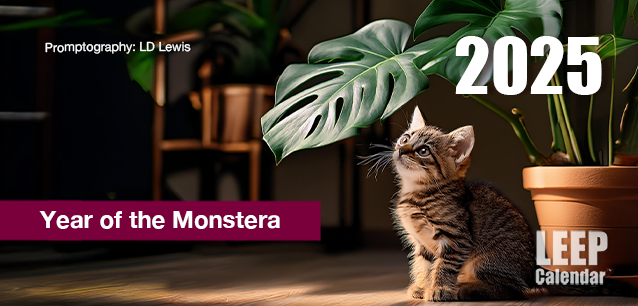 AD
AD
Today is: January 09
Scroll to explore events active on this date.
LEEP INK FEATURES

Part II
There are several unique focuses for 2025. I covered the first 12 in Part One. The following are the rest I have discovered for this year. As with all issues of LEEP Ink, the following descriptions are a...

January—It is a New Year!
We've arrived at another new year; the older I get, the more frequently they come. When I was younger, years seemed to take a long time to pass. Now, they're just a blip—here and gone. For ma...

2025 is the Year of...
21 Themes and 'Year of' Events for 2025 PART ONE, THE FIRST 12 Every year, various organizations announce the theme for the year. These themes can focus on causes, such as aesthetics and color tre...
About 2025, the Year of the Monstera
Real Estate
Ends: Dec 31, 2025
DESCRIPTION:
THE PEAK-A-BOO PLANT:
2025 IS THE YEAR OF THE MONSTERA
The National Garden Bureau has designated 2025 as the Year of the Monstera to celebrate this iconic and trendy houseplant. With its dramatic, perforated leaves and robust growth, the Monstera is a unique beauty that captivates plant enthusiasts and gardeners. This designation aims to highlight Monstera plants' unparalleled beauty and versatility, inspiring their cultivation and appreciation.
Monstera is a genus of tropical plants in the Araceae family, commonly known for their large, fenestrated leaves. Depending on the species, Monstera plants can grow quite large, with some reaching up to 10 feet in height. The most popular species within this genus is Monstera deliciosa, also known as the Swiss cheese plant, due to its distinctive leaf holes and splits.ORIGINS AND IDEAL GROWING CONDITIONS
Monstera plants are native to the tropical rainforests of Central and South America. They grow best in the following conditions:
—Indirect Light: Monstera plants thrive in bright, indirect light but can tolerate lower light conditions, making them versatile for indoor environments.
—Well-Draining Soil: They prefer well-draining, rich soil that retains moisture but does not become waterlogged. A mix designed for aroids or general houseplant soil mixed with perlite works well.
—Humidity and Warmth: As tropical plants, Monsteras prefer high humidity and warm temperatures, ideally between 65°F to 85°F (18°C to 29°C). They should be kept away from cold drafts and sudden temperature changes.MEDICINAL USES
While Monstera plants are not widely known for medicinal uses, they have been traditionally used in some cultures:
—Folk Remedies: In some indigenous cultures of Central and South America, parts of the Monstera plant have been used in folk remedies for their purported healing properties.
—Fruit: Monstera delicious fruit is edible when fully ripe and is said to have medicinal properties, although it must be consumed cautiously due to potential toxicity when unripe.
However, Monstera plants are primarily valued for their ornamental qualities rather than medicinal uses.POPULARITY AND APPEAL
Monstera plants have become incredibly popular for several reasons:
—Aesthetic Appeal: Monstera plants' dramatic, perforated leaves are visually striking and add a tropical flair to indoor spaces. Their unique leaf patterns make them a favorite among interior designers and plant enthusiasts.
—Easy Care: Monsteras are relatively easy to care for, making them suitable for novice and experienced plant owners. They are adaptable to various indoor conditions and can tolerate occasional neglect.
—Air Purification: Monstera plants contribute to a healthier indoor environment. They help improve air quality by removing toxins and increasing humidity, making your home a more pleasant and health-conscious space. This added benefit, along with their unique beauty and ease of care, makes Monstera plants popular among plant enthusiasts.
—Versatility: Monsteras can be grown as climbers with the support of a moss pole or trellis or allowed to trail and spread, providing flexibility in their display.
The Year of the Monstera aims to celebrate this popular houseplant's unique beauty and versatility. Through this designation, the National Garden Bureau seeks to educate the public about Monstera care, promote its benefits, and encourage more people to include Monstera plants in their homes and gardens.
VIDEOS
SUPPORTING DOCUMENTS
Currently, this event does not have supporting documents.
ADDITIONAL IMAGES
Currently, this event does not have supporting images.
Where would you like to go now?
 AD
AD


/footer-logo.svg)
